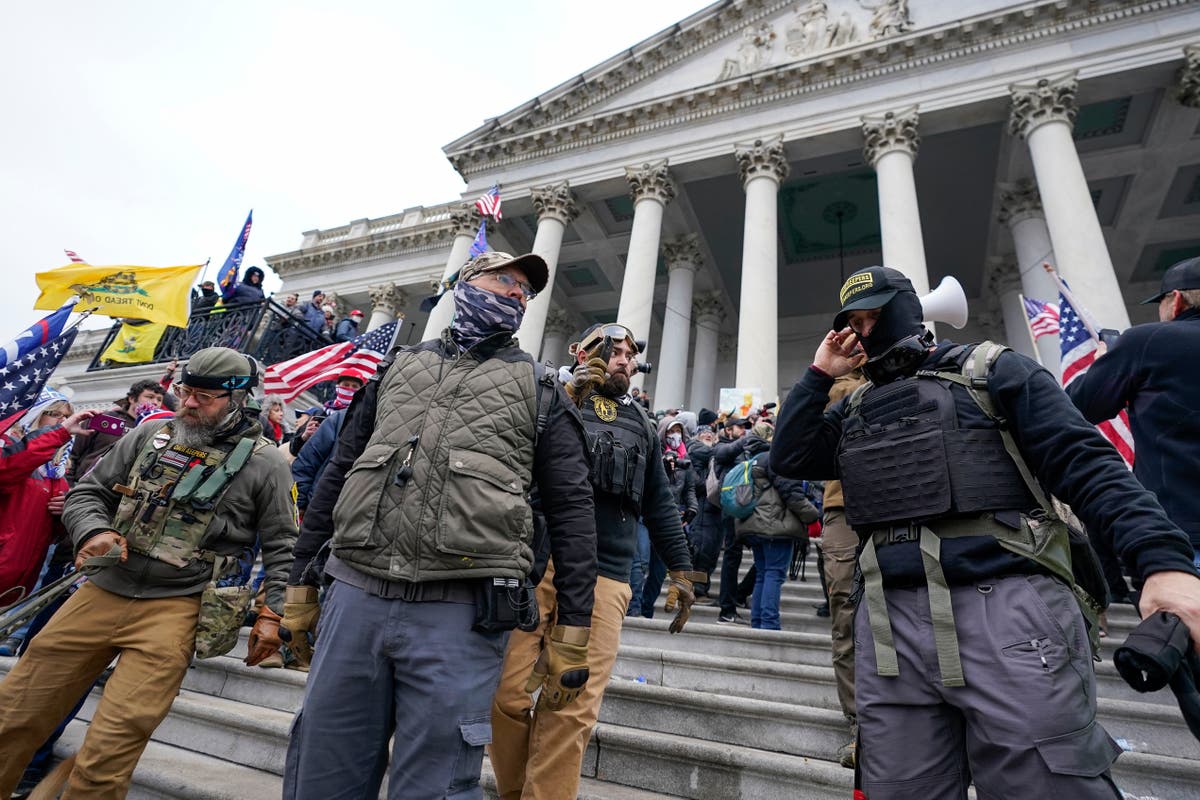Federal prosecutors will present their case against the founder Oath keepers The extremist group and four of its associates have been charged in the most serious case ever to go to trial in the January 6, 2021, attack on the US Capitol.
Opening statements are expected on Monday WashingtonStewart Rhodes and others are on trial in federal court on sedition charges for what prosecutors say was a week-long plot to stop a Republican handover Donald Trump to the democrats Joe Biden.
Defense attorneys will also get their first chance to address jurors, who were selected last week after days of questioning about their feelings about the uprising, Trump supporters and other issues.
The stakes are high for the Justice Department, which last sought a seditious conspiracy conviction at trial nearly 30 years ago.
About 900 people were charged and hundreds convicted for the attack on the Capitol. Demonstrators broke through police barriers, engaged in hand-to-hand combat with officers, broke windows and stopped the certification of Biden’s victory in the election.
But the Oath Keepers were the first to stand trial on charges of seditious conspiracy, a rare Civil War-era charge that carries up to 20 years behind bars. The trial is expected to last several weeks.
Prosecutors will tell jurors that the uprising by the anti-government group was not a spontaneous outburst of anger fueled by the election, but part of a long-running plot to prevent Biden from entering the White House.
On trial with Rhodes, of Granbury, Texas, are Kelly Maggs, leader of the Florida chapter of Oath Keepers; Kenneth Harrelson, another Florida Oath Keeper; Thomas Caldwell, a retired U.S. Navy intelligence officer from Virginia; and Jessica Watkins, who led the Ohio militia group. A number of other charges have also been brought against him.
Authorities say Rhodes began plotting to overturn Biden’s victory just days after the election. Court records show the oath keepers repeatedly warned of the prospect of violence — or “a bloody, bloody civil war,” as Rhodes put it in one of the calls — if Biden becomes president.
By December, Rhodes and the Oath Keepers targeted Congressional certification of the Jan. 6 Electoral College vote, authorities said.
The Oath Keepers organized training sessions — including in “unconventional warfare” — and stashed the weapons in a Virginia hotel so they could quickly bring them to the capital if needed, prosecutors said. Over a few days in early January, Rhodes spent $15,500 on weapons, including an AR-platform rifle, magazines, mounts, scopes and other equipment, court documents state.
On Jan. 6, Oath Keepers equipped with communications gear, helmets, vests and other combat gear were seen on camera storming the Capitol. Rhodes is not accused of going inside, but phone records show he communicated with Oath Keepers, who did enter around the time of the disturbance, and was seen with members outside afterward.
And prosecutors claim that the conspiracy did not end on January 6. In the days between the riots and Biden’s inauguration, Rhodes spent more than $17,000 on firearms parts, magazines, ammunition and other items, prosecutors say. Around the time of the inauguration, Rhodes told others to organize local militias to oppose the Democratic administration, authorities say.
“Patriots walking into their own Capitol to send a message to traitors is NOTHING compared to what lies ahead,” Rhodes wrote in a post on the evening of January 6.
The lawyers said the oath keepers came to Washington only to provide security at events for figures such as Trump associate Roger Stone before the president’s large outdoor rally behind the White House. Rhodes stated that there was no plan to attack the Capitol and that the members who did were acting on their own.
Rhodes’ lawyers are prepared to argue that jurors cannot convict him of conspiracy because everything he did before Jan. 6 was in preparation for the orders he expected from Trump — orders that never came.
Rhodes’ attorney said his client would eventually take the stand to argue that he believed Trump was going to invoke the Insurrection Act and call in the militia, which Rhodes urged him to do to prevent Biden from becoming president. Rhodes’ lawyers will argue that what prosecutors alleged was an illegal conspiracy was simply lobbying the president to use U.S. law.
Prosecutors say Rhodes’ own words show he was going to act regardless of what Trump did. In one post from December 2020, Rhodes wrote that Trump “must know that if he doesn’t act, we will.”
The most recent successful sedition case was against the Egyptian cleric Sheikh Omar Abdel-Rahman and nine of his followers, who were convicted of conspiring to blow up the United Nations, an FBI building, and two tunnels and a bridge connecting New York and New Jersey.
___
For complete coverage of the Capitol riot, go to https://www.apnews.com/capitol-siege






